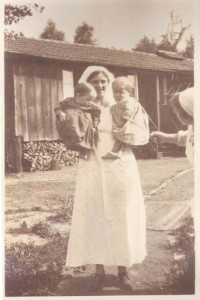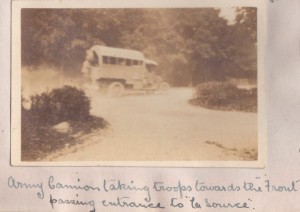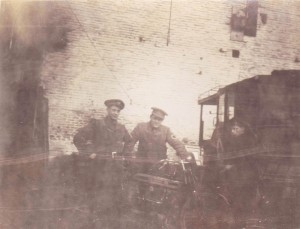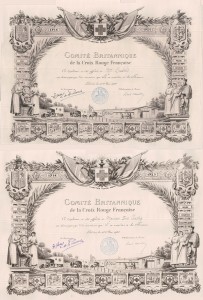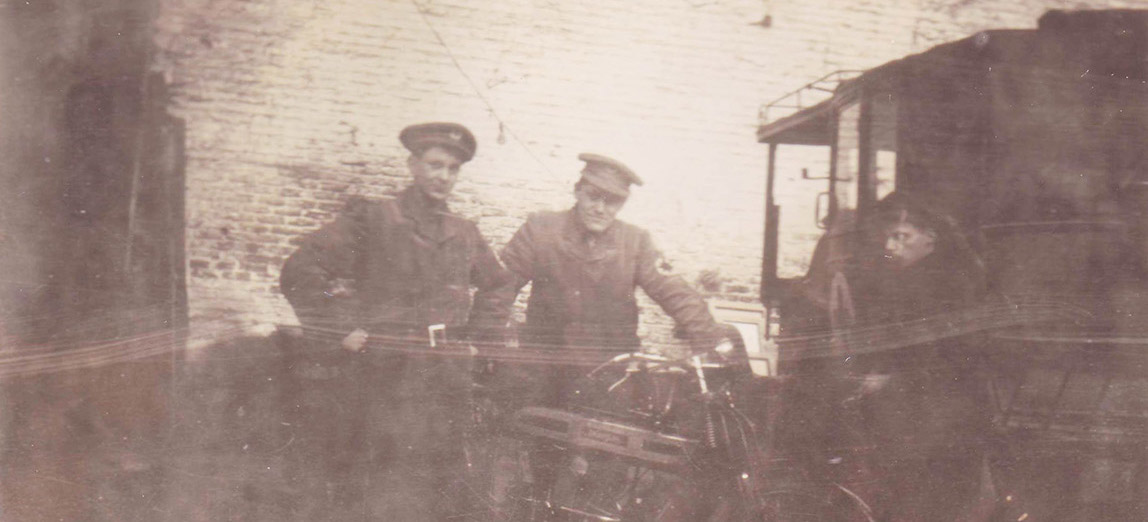
Fred Crossley was a Lancastrian Quaker who, at the outbreak of war, was living and working as an engineer in Bentham, North Yorkshire. When conscripted, he joined the Friends War Victims Relief Committee and worked in Sermaize in France alongside his wife, Elizabeth, who also volunteered. The area had been devastated by the conflict and the FWVRC members helped to construct new housing and provide hospital care for local civilians. During his time in France Fred took photographs of the people and places he saw ‘behind the lines’ and catalogued them carefully. Soldiers at that time were forbidden to take cameras to the front, making Fred’s fascinating – and very rare – collection of war photographs all the more valuable.
Fred Crossley: WW1 CO and Photographer in France
Posted by Nick Beddoe, with support from Paul Crossley
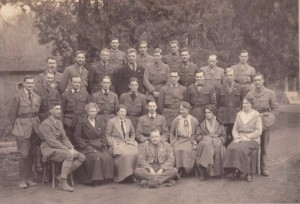
Fred Crossley and other members of the FWVRC (Fred is in the second row from the back, far right) Byline: All photographs are courtesy of Paul Crossley
Fred’s early life
Fred Crossley was one of seven boys. He was born in Oldham and, like many children at the time, left school early although he started an engineering course at night school. This sound knowledge and understanding of his chosen subject proved to be invaluable in later years.
Fred and one of his brothers called Joe married two sisters. Fred’s wedding took place in 1907 at the Friends Meeting House in Bolton, after which he lived with his in-laws while employed as a general engineering worker. The Quaker connection at this time is somewhat vague. From the time of his marriage he became a Quaker, although not all of his family were involved with the Quakers. There also appears to be a connection with Northern Ireland through his wife’s family in terms of Fred’s Quakerism but this also is somewhat vague.
World War 1
At the start of World War 1 Fred was working as an engineer at a silk mill in Bentham. There were over thirty COs in Bentham at the time and, with most having families and various types of employment, it’s safe to assume that a strong support network existed. Fred initially avoided conscription because of his Quaker beliefs but at a later date his objection was upheld but with conditions. It was at this point that he volunteered to work overseas with the Friends War Victims Relief Committee (FWVRC).
There were over thirty COs in Bentham at the time and, with most having families and various types of employment, it’s safe to assume that a strong support network existed.
The FWVRC was an official arm of the British Quakers which was set up to relieve civilian distress in practical ways, primarily at times of armed conflict. It was first established in 1870 at the time of the Franco-Prussian war and was formally reconstituted at the start of the First World War. It was at this time that Fred and his wife, Elizabeth, went to assist in France. They were based in a district called Sermaize, which had been severely damaged by the first German offensive. The remit at the time involved establishing the community, as well as helping to run two hospitals and an urgently needed maternity hospital.
Between them, they and others like them did their utmost to return a normal semblance of life to an area ravaged by war.
Fred’s extensive collection of photographs from the time provides an invaluable record of the life that was led by all concerned, ranging from pictures of orphans being cared for through to one photograph of troops being rushed to the front. With troop movements so close it is impressive to see the work being carried out: the erection of pre-fabricated houses, the collection of harvests and, importantly in Fred’s case, the offering of technical expertise, possibly with the maintenance of vehicles, cooking and heating systems. Elizabeth worked in one of the hospitals. Between them, they and others like them did their utmost to return a normal semblance of life to an area ravaged by war.
Paul Crossley, who is Fred’s grandson, said recently that he “wondered what life must have been like” for his grandfather, as well as “how much the support given by my Grandmother and other wives” contributed to the resilience of COs.
After the War
Paul Crossley, who is Fred’s grandson, said recently that he “wondered what life must have been like” for his grandfather, as well as “how much the support given by my Grandmother and other wives” contributed to the resilience of COs. We can safely assume the experience had a deep effect on Fred and Elizabeth because, on their return to Britain, they had a house built in Bentham and named it “Sermaize”. There was also lasting gratitude on the part of the French Red Cross as they awarded diplomas to Fred and Elizabeth on May 10th, 1920 in appreciation of their work helping civilians during the war.


